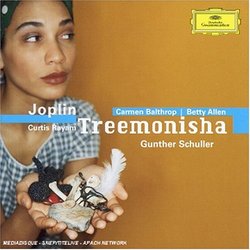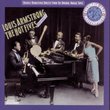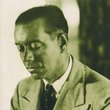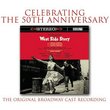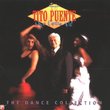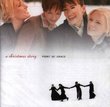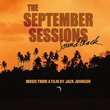| All Artists: Scott Joplin, Gunther Schuller, Ben Harney, Betty Allen, Carmen Balthrop, Cora Johnson, Curtis Rayam, Dorceal Duckens, Dwight Ransom, Edward Pierson, Kenneth Hicks, Raymond Bazemore, Willard White Title: Joplin: Treemonisha Members Wishing: 1 Total Copies: 0 Label: Deutsche Grammophon Release Date: 7/12/2005 Genre: Classical Styles: Opera & Classical Vocal, Historical Periods, Modern, 20th, & 21st Century Number of Discs: 2 SwapaCD Credits: 2 UPCs: 028947755906, 002894775590 |
Search - Scott Joplin, Gunther Schuller, Ben Harney :: Joplin: Treemonisha
CD DetailsSimilarly Requested CDs
|
Member CD ReviewsReviewed on 2/1/2010... I haven't heard the other orchestrations of this wonderful opera, but this one is the one I've known since it came out on LP. It's very clear and beautiful, and the balance between the orchestra and singers is just right. An important milestone in American music, and one that lay undiscovered for many years. It isn't all ragtime, of course. Some of the unsyncopated parts are close to Donizetti or Bellini. Wonderful harmonies and melodies!
CD ReviewsA Truly AMERICAN Opera! John | Iowa, USA | 02/20/2008 (5 out of 5 stars) "Another reviewer has suggested that Joplin's libretto for Treemonisha is somewhat--ummm--less than profound. This may be superficially true, but I also submit the libretti of any number of 19th-century European operas as exhibit A that Treemonisha is, by comparison, an engaging and credible tale. By 21st-century standards, the story of Treemonisha may appear silly. One should bear in mind, however, that Joplin was born in the American south (Texas) before 1870, and in a time when many newly-freed African-American former slaves were just beginning to cope with living outside plantations where they had been enslaved. Many turned to superstition, some based roughly on folk-memory of African religions, as a means to order their society. Joplin saw this first-hand as a child, and certainly knew and thought about the phenomenon. Thus, what may appear hopelessly silly to us in the 21st century has a great basis in the truth of life for African-Americans in the American south immediately post-Civil-War. Joplin uses stories he heard or witnessed to make his own point: that the only way out of ignorance and superstition is through education. Taken in this light--which is the only fair way to judge the libretto, by the way--the story of Treemonisha is an important cautionary tale for future descendants of slaves in America. There is another interesting point to be noted. It is Treemonisha, an 18-year-old young woman, whom the community of former slaves--including most members of the superstitious cult--choose as their leader. It is NOT either of her parents. It is NOT an older member of the community, or a male. In what had been a primarily matriarchal society and, given the cruelties of slavery, a very unstable one, it is an obviously intelligent and forward-looking FEMALE who is chosen to lead her community. Moreover, she is chosen because she is the best-educated member of the community, and commits herself to leading her followers intellectually, rather than through superstition, force, or fear. I submit that there is much modern society could learn from thoughtful consideration of this story. A major problem many encounter when first hearing or seeing Treemonisha is their expectation of a "ragtime" opera, whatever that might be. While he is best known today for his piano rags, Joplin is a far more complex person and composer than that. Treemonisha is exactly what it claims to be: a 19th-century opera by a Black American composer. While Joplin certainly makes good use of vernacular elements (as did almost every composer of 19th-century European operas), his opera bears a much closer resemblance to its European counterparts than it does to, for instance, popular stage musicals of his day. This is OPERA, writ large. It is, to be sure, clearly American, clearly not the product of a conservatory-educated composer, clearly not written to a "standard" libretto. But it IS an opera, and a very nearly unique one. Beyond that, Treemonisha is completely charming and endearing. It has memorable arias, ensembles, and choruses. It works very well as theater. It teaches an admirable lesson. And I defy ANYONE to listen to it a time or two and not come away humming several melodies for months or even years. The performance is stunning. Schuller's re-orchestration of Joplin's lost full score is superb, and based in a scholarly and emotional understanding of Joplin's compositional methods. Would that this opera would become more common in performance by major houses! Another very important aspect of Treemonisha is that there is never a moment when there is not something interesting and often innovative happening during the performance. This is as gripping as any cop show on TV or detective page-turner at your local bookstore. Once you start listening to Treemonisha, you pretty much have to FINISH listening to Treemonisha, even if you know how it ends. If you think Scott Joplin wasn't anything more than an itinerant performer of some catchy popular music at the turn of the 20th century, this piece should cure your blindness very quickly. Oh--by the way--Joplin's piano rags are intended to be played PRECISELY as they appear on the printed page, and Joplin wrote some specific instructions about how this should be accomplished. In this respect, the piano rags bear much more resemblance to Chopin's Etudes than they do to Hoagy Carmichael's songs. Using the rags as a basis for improvisation is fine, but it is not Joplin. " Treemonisha David A. Mcelroy | 09/11/2009 (5 out of 5 stars) "This is an interesting operaand a great performance. it is going to be performed by the Wasington Savoyards at the Atlas Performing Arts Center in 2010."
|

